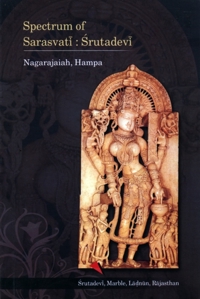|
The two and four armed images are found at many places. Six, eight and sixteen armed Śrutadevī images are not many. The six- armed image in the Luna Vasahī (Mt. Abu), eight-armed image in Ajitanātha temple at Tārangā (Mehsana, Gujarat), and the sixteen-armed image in the ceiling of world-renowned Vimala Vasahi marble temple (Mt. Abu), are outstanding; "Attended by a dancing male figure on each side, the goddess sits in bhadrāsana showing the lotus, the book and the kamaṇḍala in the three left ones. All other hands, along with the symbols, are mutilated beyond recognition. The figure of swan can however be seen on the pedestal. A small Vimala Vasahī ceiling figure of a Tirthankara is seated above the crown" [Shah:1941: 210].
This shows that Sarasvatī enjoyed highest respect to the extent that she could figure on the same platform with Tīrthaṅkaras, because, she is Śrutadevī, Jinavāṇi and Jinavānimātā. In other words, she is the embodiment of Jina's teachings. It is in this sense Pampa (941 CE) stated emphatically - Parama-jinendravāṇiye Sarasvatī, 'Sarasvatī is the embodiment of the supreme teachings of Lord Jina' [Ādipurāṇa: 1-9]. Similarly another Kannada poet Nemicandra (1175) states - Jinendraruktiye Sarasvatī, 'Sarasvatī is the speech of Jina' [Neminātha purāṇam - 1-38].
tvamasi ca Jinavāñjalim kṣipet.āṇi sveṣṭamuktyaṅga mukhyā
tadiha tava padābjambhūribhaktyāṁ-namāmah
iti Śrutadevī stavanaṁ paṭhitvā
pratimopari puṣp
[Nemicandra (1543 CE), Pratiṣṭātilakam]. While reciting the hymn of praise of Śrutadevī, handful of flowers are respectfully placed on the image with her laudation - 'you are the Jinavāṇi, preaching of Jina'. According to the Nirvāṇakalikā, of Pādliptasūrī (10th century), Śrutadevī is white in complexion, possessing varada, 'boon-conferring gesture', lotus, manuscript (book), and rosary in her four arms, and haṁsa, 'goose' as her mount. But Digaṁbara author Āśādhara states Mayūra, 'peacock', as her vehicle;
Mayūravāhanyai namaḥ iti vāgadhidevatāṁ stāpayeth I [Āśādhara, Pratiṣṭhā-sāroddhāra]
The Nirvāṇakalikā records the mantra-Dvādaśāṅga Srutadevādhidevate Sarasvatyai svāhā.
 Prof. Dr. Nagarajaiah Hampana
Prof. Dr. Nagarajaiah Hampana

